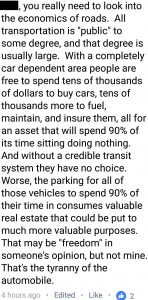Pay attention to the next person you encounter who advocates for socialism, in part or in whole. Or, who decries capitalism as unfair and unjust and declares that government intervention and central planning are “necessary” to correct wrongs and injustices. Or, who wears a Che T-shirt or declares for Antifa or voices support for big government politicians and heavy-handed regulation.
More specifically, pay attention to what he or she expects to change.
You can take it to the bank that, almost without exception, this person is expecting to come out ahead after whatever changes he or she advocates are instituted. Whether it be greater wealth, easier work, or fewer responsibilities, there’s a personal benefit angle involved.
How often do you hear the flip side of the collectivist argument, the first half of Marx’s mantra, “From each according to his ability…?” How often do you hear the acceptance that, under socialist governance, that free college education couldn’t be used to pursue useless degrees like “Comparative [fill in the blank] Studies,” or even pursue a degree one isn’t highly qualified for? Fact is, in many countries with free college, people have to test into degree programs, not merely enroll in them.
How often do you hear an understanding that jobs should be allocated based on skill and talent, not chosen and competed for in an open market? What happens if the Che-wearing kid is told “you’re big and strong, but not that bright – you’ll serve society best by digging ditches all day?” Is he going to say “I wanted to be a poet, but, hey, that’s best for society, I’ll happily dig ditches.”
No. It’s always “how can society be forcibly bent by government in a fashion that better suits me and my world view.”

Consider the attached comment, copied from Facebook. What is the commenter really saying? His assertion that roads are collectivist is hooey, of course. Roads are not collectivist. People who use them pay for them, via gasoline taxes, registration fees, tolls, etc, but, that’s not even the commenter’s plaint. His “argument” is that the money spent on cars is being used inefficiently, and that the real estate used to store those cares is another inefficiency. Presumably, the money spent to build and maintain the roads is a third inefficiency.
He then scare-quotes “freedom,” clearly implying that individuals’ choices, preferences, priorities, and pleasures are not within the proper bounds or correct understanding of the word. His idea of “freedom” requires a public transportation system, so people can be “free” to choose not to own a car. Of course, paying for this system requires infringing on others’ freedoms, and it also requires the assumption that those who want the public transportation system get to say they want it wherever they choose to live.
The thing is – someone who wants a car-free existence can easily live it simply by moving somewhere with robust public transportation. THAT is freedom, and it is how stuff like this gets sorted out without the heavy boot of central planning. If people who want robust public transportation move to places where it exists or is burgeoning, the population growth will support expansion of that infrastructure. No need for someone to decide to build it against the community’s will.
But, that’s not how the commenter wants things to be. Heaven forbid people organize themselves in a fashion that doesn’t align with his world view. Their ideas of freedom are subordinate to his, and by golly, he’s right and they’re wrong. So, he wants to manage everyone else’s life. He wants people’s money spent in ways he demands, and justifies it by saying that they don’t have a choice but to buy cars and pay for the spaces to keep them. No consideration that people who don’t want this can resolve their wishes without government forcing his solution. No acceptance that what he demands can only be had by infringing upon others’ freedoms and rights.
The hammer, not the nail. The boot, not the neck.
That is the truth of socialists, communists, collectivists, fascists, and the other species in the statism genus. They keep their ideas alive by peddling them as altruistic and fairer than the unseemly selfishness of capitalism and liberty, but who’s more selfish? The person who wants to keep his own money and manage his own life, or the person who wants to control other people’s money and lives?

I spent decades trying to understand the mind of the modern left wing person. I arrived at a similar conclusion as you; the mind of the left is inherently selfish, but fools himself by projecting benefits onto society of which he is a member. Whatever benefits are to be extracted from government, he’s in that receiving line, with little regard for how these benefits come into existence, or the appropriateness of public transportation in, say, Wyoming.